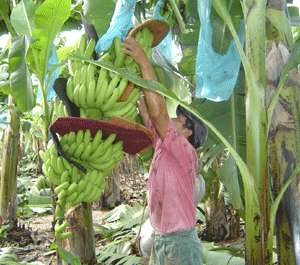Feb 5, 2013
Even as the Maldivian government further shuts the door on worker rights, union leaders and members of the Maldives Port Workers Union (MPWU) who were fired or suspended from their jobs in 2012 remain strong in their struggle. In recent days, Maldives President Mohammed Waheed Hassan Mani signed a bill into law that restricts freedom of assembly throughout the island nation. This move follows the firing and suspension of MPWU leaders and members by the state-owned Maldives Port Ltd. early last year.
The MPWU, an independent union that was officially registered in May 2011, says port management violated the country’s labor laws and International Labor Organization (ILO) conventions when it fired the union president, general secretary and four other union members, suspended 49 trade union members and transferred others to different locations. MPWU members have faced harassment by port management, which the union says has used intimidation tactics to prevent members from participating in union activities. The MPWU has filed a labor complaint with the ILO.
Further, the MPWU says MPL established another workplace union in an attempt to dismantle the newly formed union. “It’s our responsibility to speak out to protect our rights,” said MPWU President Ibrahim Khaleel. “We should take action … for a better work environment, for better pay.”
The MPWU is a member of the International Transport Workers’ Federation (ITF), which has written twice to Manik calling for him to intervene. The ITF has received no response. The ILO also has written to the Maldives government asking it to rectify the injustice against WPWU members.
The MPWU is allied with the Tourism Employees Association of Maldives (TEAM), which joined in solidarity with the union’s struggle to protect labor rights. TEAM, a Solidarity Center partner, is working to get 22 of its members reinstated after they were terminated. The workers were among 350 who held a peaceful work stoppage in 2011 on a key pay issue. Management refused to comply with the court order to reinstate workers and compensate them with back pay and is appealing the decision.
TEAM is a member of the International Union of Foodworkers (IUF).
Feb 5, 2013

Family and friends attend the funeral of slain trade unionist, Juan Carlos Pérez Muñoz. Credit: Robinson Cook
Juan Carlos Pérez Muñoz, a trade union member in Colombia, was gunned down last week on his way to board a bus to the Cauca River Valley where he worked in the sugarcane fields.
The death of Pérez, 30, a leader in the SINTRAINAGRO union’s struggle for living wages and decent working conditions at the La Cabaña sugar plantation, came just days after two rallies by sugarcane workers. The workers were protesting the firing of 87 employees of the La Cabaña and 24 employees Maria Luisa plantations. Since December, when the sugarcane workers collectively began pushing for workplace improvements through SINTRAINAGRO, workers have been subjected to threatening phone calls and other forms of harassment, and the company has refused to negotiate.
“Anti-union violence and the victimization of the workers is still growing,” the union federation CUT (Central Unitaria de Trabajadores de Colombia), said in a statement. In Colombia, “the rights of workers continue to be violated,” CUT Human Rights Director Alberto Vanegas Zuluaga, told Colombia Reports.
Sugarcane development is a thriving business in Valle del Cauca. Nearly half its cultivated area is devoted to sugarcane production as either raw sugar or ethanol, about one-third of it for export. Sugarcane cutters work as long as 14 hours per day and make as little as $200 a month. Because they are largely subcontracted, they receive no health care or pensions and must provide their own safety equipment—and have no recourse if they are injured on the job.
Colombia remains the deadliest country for union leaders and members. In 2012, 19 trade unionists were murdered and there were at least 10 attempted murders, according to the Colombian non-governmental organization, Escuela Nacional Sindical. The International TradeUnion Confederation (ITUC) says that although some efforts have been made to investigate these crimes, the majority of the cases reported by trade union organizations remain unsolved.
In recent meetings with the Minister of Labor and the Minister of the Interior, SINTRAINAGRO and CUT denounced the violence and threats to leaders and members of the sugarcane workers’ union and to SINTRAINAGRO’s national leadership and asked the governmentto provide protection. They made clear that without government protection, more unionists would be killed. Perez was gunned down a few days later, leaving behind his wife, Luz Aidé, and son.
Feb 1, 2013

A Guatemalan banana worker.
Since 2007, 64 trade unionists have been murdered in Guatemala, and hundreds more union leaders and members have been kidnapped, tortured and threatened with death—all part of an ongoing pattern of violations against worker rights, according to Britain’s Trade Union Congress (TUC). Only a small fraction of these incidents have been investigated, and 98 percent of these crimes have not been punished.
Over the past 20 years, the international community has appealed to the Guatemalan government to address serious human rights violations, to little effect. The TUC now is adding its voice in urging the International Labor Organization (ILO) governing board to establish a special inquiry commission—its highest investigative body—to push for needed reforms. Last June, 10 worker delegates to the ILO’s Labor Conference, from Asia, Africa, Europe, and the Americas, filed a request with the ILO for such a commission.
Guatemalan unions have sent detailed recommendations for improved labor rights compliance to its government, filed under the Dominican Republic-Central American Free Trade Agreement (DR-CAFTA) complaint process. In 2008, six Guatemalan trade unions filed a complaint about the suppression of worker rights under the trade agreement. The case advanced to the disputeresolution phase in 2011 and is still pending.
Members of Guatemala’s Union of Izabal Banana Workers (SITRABI) are particularly threatened. In 2011, four of the 10 trade unionists murdered in Guatemala were from SITRABI, a long-time Solidarity Center partner, and the murder of SITRABI members continued into 2012. The International Trade Union Confederation (ITUC) 2012 Survey of Trade Union Rights described Guatemala as “characterized predominantly by human rights violations,” as the “right to life of trade union, rural and indigenous community leaders and human rights defenders continued to be violated.”
Meanwhile, the Guatemalan government has for several decades supported the maquila (light manufacturing) industry through tax holidays and the failure to enforce its labor laws. Any company exporting more than 51 percent of production can be classified as a maquila and so qualify for significant tax breaks. Although the law requires businesses to respect labor law to receive tax breaks, employers are rarely penalized for retaliating against workers who seek to form unions, even though employer tactics include targeted or mass firings, death threats, blacklists or plant closings (and sometimes reopening elsewhere under a new name).
For example, at the Ternium aluminum processing plant in Villa Nueva, Emeterio Nach was among workers fired in recent months after seeking to form a union. “Management used to tell us they can do whatever they want with the workers,” said Nach, speaking through a translator. “They didn’t care about the Ministry of Labor or inspections or anything. I could never take a day off.”
Nach’s experience is all-too common for Guatemalan workers who, when seeking to improve their wages and working conditions, lose their jobs and, sometimes, their livees.
Jan 31, 2013
Some 2.5 million mine workers in Rajasthan, India, will now be covered by worker compensation for job-related illnesses and injuries, a victory that stems from a multiyear campaign by safety and health advocates. The decision this week by the state of Rajasthan, in northwest India, also provides compensation to widows of miners who died from silicosis and creates a structure for improved safety standards.
The Rajasthan-based Mine Labor Protection Campaign (MLPC) is a member of the Asian Network for the Rights of Occupational and Environmental Victims (ANROEV), a Solidarity Center partner comprised of trade unions, worker rights organizations and occupational safety and health activists from across the region. MLPC pushed for monetary relief for silicosis victims and their families and demanded the government develop a list of Rajasthan’s 30,000 mines. Only 3,706 mines are registered with the Department of Mines, making it impossible to ensure mine safety, according to the MLPC.
Because the central government oversees the regulatory agency on mine safety, these new standards ultimately will apply to the entire country, according to the MLPC.
Silicosis, an occupational lung disease caused by inhalation of crystalline silica dust, is incurable—but it is also preventable. In 2006, the National Human Rights Commission declared silicosis an important health problem in India and began accepting complaints on silicosis.
The director general of mine safety will now issue notices to 27,000 mine owners, asking them to update their information within three months or face action. According to the Hindustan Times, the mine safety director general said if the mine owners did not give information about the workers, they would be prosecuted after an inspection of the mines. The agreement also establishes hospital facilities for diagnosing silicosis, which for many years was not correctly diagnosed, according to the Times of India.
Most of India’s miners are internal migrants—people forced by poverty, drought, famine or failed crops to take up this difficult and sometimes deadly job. Ninety-eight percent of miners are tribal or Dalit (belonging to the so-called untouchable class), which places them among the most marginalized of India’s poor, systematically deprived of decent wages and social service support.
This victory follows on the heels of an August 2012 announcement by the Gujarat state government that the heirs of agate workers who die as a result of silicosis be compensated through an insurance scheme. The People’s Training and Research Center, another ANROEV partner, helped secure this protection for workers and their families.

Jan 29, 2013
The economic benefits of trade unions in the workplace often enable adult workers to support their families without sending their children to work. Further, a union presence generally prevents employers from employing children. Unions also can improve livelihoods through collective bargaining agreements. These agreements can call for skills-training programs, including apprenticeships, at workplaces. Such programs provide opportunities for young workers to enter the workforce by learning productive work skills and help break the poverty cycle that perpetuates child labor.
• Unions also have the ability to bargain for benefits (such as access to schools or daycare facilities), as well as to advocate effectively for national and local policies that address the root causes of child labor and aid in enforcement.
In the informal economy, unions and informal economy associations can advocate to:
• Reduce informal work by placing it within the framework of a country’s overall labor laws and policies.
• Prevent work currently in the formal sector from being informalized.
• Ensure that the minimum wage and other labor laws and regulations that apply to the formal economy apply to informal economy.
• Enable formal sector trade unions to organize and represent the needs of workers, regardless of their formal or informal employment status.



